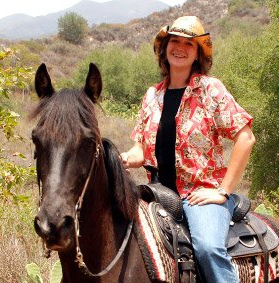I saved a horse and a horse saved me
The Daily Titan
By Hannah Dellinger – Posted on November 28, 2011
 One, two, three, four spur, two-point, jump! Sit up, heels down, shoulders back, look to the next jump. Only five more jumps to go.
One, two, three, four spur, two-point, jump! Sit up, heels down, shoulders back, look to the next jump. Only five more jumps to go.
“C’mon Maxy, we got this. Keep up the pace,” I whispered to my horse.
We come up to the next one, perfect distance. I have to keep spurring, because he’s not used to jumping this much in a day. We had already jumped four other courses and he was getting tired. We came to the final jump; I gave a big kick and spur to get him over. Another perfect distance. Max pins up his two front legs and soars over the red and white flowered jump below us. We did it.
It was our first and last show together. Max was my best friend, my confidant and my therapy. I started leasing him from a friend exactly a year ago and we had been working up to this point the whole time. I was so proud we placed in this show and that he was so well behaved. I wanted to buy him from my friend, but there was no way I could afford the $500 per month board, plus veterinary bills and food. I knew that I couldn’t even afford the monthly $250 for his lease much longer.
The next week I showed up at our barn to ride my baby, Max. Yearning to see his big, friendly black eyes looking back at me, his shiny dark brown fur, his small shiny hoofs, his soft, warm fuzzy face and swishing luxurious tail, I rushed down to the stable. But to my surprise, all I saw was an empty stall. He was gone for good. My friend had sold him without telling me and my heart sank. Where there was once happiness and fulfillment, there was now a void. My baby was gone.
Ever since I lost Max, I’ve been searching for a way to be around horses. I looked online and stumbled upon horse rescue barns all over Southern California that had horses that needed the love I had to give. Hanaeleh, a horse rescue and adoption group, stuck out to me. Hanaeleh is located in beautiful Trabuco Canyon and they’re always accepting volunteers.
Last week, I made the trip to Trabuco Canyon to see unwanted, abused and abandoned horses. I walked the uphill dirt road to the familiar smell of horses and smiled. I saw horses with healed wounds, metaphorically and literally.
“Our T-shirts say … ‘I saved a horse and a horse saved me.’ And that’s how we feel about the horses,” said Helen Grohman-Collins, a volunteer at Hanaeleh.
It was then I realized even if I couldn’t afford a horse of my own, there are so many that needed what I had to give: unconditional love.
Hanaeleh Horse Rescue from Daily Titan on Vimeo.
As I walked around the barn, Elizabeth Zarkos, the founder of Hanaeleh, told me the story of each and every horse on their property. Some were mistreated with visible markings of abuse, even after years had passed. Some were simply too much of a financial burden for their owners to carry and they were in danger of going to auction where they are most likely sold to be shipped to Canada or Mexico for slaughter.
“In California we actually have a prohibition on the sale of horses for slaughter. But it doesn’t do anything because there’s zero enforcement,” said Zarkos.
She went on to explain that anyone could go to Mexico or Canada to sell horses to a slaughter house because there is no system in place to monitor such transactions.
According to Zarkos, it’s common for people to steal others’ horses just for the money they would get at a slaughterhouse.
“These guys are not cows. They’re not bred for the purpose of livestock. They’re horses, they’re companion animals. They’re very, very intelligent,” said Zarkos.
Zarkos favors having a national law prohibiting the transportation of horses across the border to prevent slaughter. There aren’t any slaughter houses in the U.S. that kill horses, but it’s easy for horses in the U.S. to end up in another country where it is legal to render horse meat.
On top of slaughter, horses also face the threat of abandonment. Because of the declining economy it’s becoming more and more common for owners not to be able to afford the upkeep of a horse, so they leave it to starve to death. Zarkos said many times horses are left in backyards to fend for themselves.
“We’ve seen it a lot in the last few years, where people just can’t afford their horse. They can’t afford to pay the board at the stable,” said Laurie Bocchicchio, the treasurer of Hanaeleh.
After seeing all of the Hanaeleh horses and hearing their stories, that passion was ignited in me again. It never really went away before, but my passion was simply unfulfilled. I want to go back to Hanaeleh to volunteer. It’s not just the riding that I miss, it’s the smell, sound and feel of horses. Just being around horses makes me feel at home and washes away all of the unimportant nagging about everyday things that go through my head.
Zarkos even suggested I take a look at their website to see if any owners need a rider to train or exercise their horses for free. My heart skipped a beat and a new hope rose inside me. I may never see my baby Max again, but that’s OK. There are so many horses out there that need someone like me as much as I need them.
See original article here.



